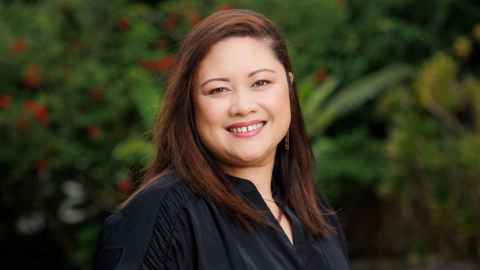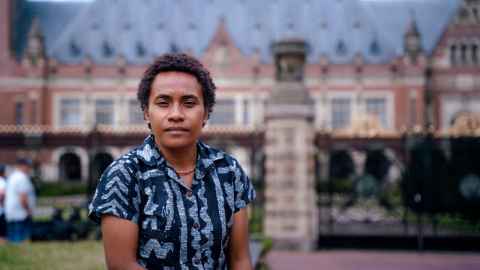Te Poutoko Ora a Kiwa applauds international ruling on climate change
24 July 2025
Te Poutoko Ora a Kiwa (Centre for Pacific and Global Health) welcomes decision countries can be held accountable for greenhouse gas emissions.

The International Court of Justice (ICJ) ruling that countries can be held legally accountable for greenhouse gas emissions has been welcomed by Te Poutoko Ora a Kiwa - Centre for Pacific and Global Health.
Co-Director Li’amanaia Dr Roannie Ng Shiu commended Pacific youth and Pacific communities for their leadership and perseverance over six years of advocacy. She says their leadership demonstrated the power of young Pacific voices to shape international systems and call the world to account.
“We extend our congratulations to the Pacific youth, student leaders and our Pacific communities in the region whose courageous advocacy and strategic vision led to this moment.”
“Their tireless efforts - supported by a coalition of Pacific governments, civil society, and legal experts - have resulted in a global legal affirmation that states have clear obligations to act on climate change."
The legal campaign, led by Vanuatu, was initiated by the Pacific Islands Students Fighting Climate Change (PISFCC). Its president, Cynthia Houniuhi, visited the University of Auckland’s Fale Pasifika two years ago as a guest panelist for Te Poutoko Ora a Kiwa’s Pacific Transnational Leadership Panel, where she joined regional leaders in discussing the future of Pacific cooperation.
Dr Ng Shiu praised the leadership of Houniuhi and the cultural integrity of the campaign.
“This opinion stems from a journey led by Pacific students and communities, speaking from lived experience - rising sea levels, disrupted ecosystems, and the health and social impacts already affecting their families."
That journey has now yielded a decision that will influence global climate action for years to come, says Ng Shiu.
"As a young Pacific female and student, she epitomizes what it means to make the impossible possible and to redefine leadership. She’s quiet and humble, but when she speaks, it’s deeply impactful. In a world that often celebrates loud and assertive voices, Cynthia’s thoughtful approach stands out.
“Her leadership, and the way the ICJ campaign was conducted, reflects not just climate justice but also cultural ethics. The integration of storytelling and community engagement ensures that people hear, understand, and embrace the message. This is promising for Indigenous and Pacific peoples - our ways of knowing and being are being valued by institutions like the ICJ.
“This ruling is not just about empowerment, but also accountability. It sends a message to powerful nations that passing the buck is no longer acceptable."
It’s the relationships we’ve built along the way that have carried us. This victory belongs to all of us.

Speaking from the Netherlands following the ICJ’s advisory opinion, Cynthia Houniuhi responded with heartfelt emotion and pride, saying it marked a significant milestone in a youth-led campaign that began in the Pacific.
“This journey has been tough but deeply rewarding,” says Houniuhi.
“It’s the relationships we’ve built along the way that have carried us. This victory belongs to all of us - especially those in rural communities who supported this work but couldn’t be here to witness it.”
Houniuhi emphasized the importance of communicating the technical decision in ways that resonate with local communities.
“We’re committed to going back and speaking with our people - to show them that their hope was not misplaced.”
Despite challenges, including the COVID-19 pandemic, the campaign adapted through digital platforms, maintaining momentum and building resilience. Houniuhi highlighted the courage and unity of Pacific youth and governments, and the importance of inclusive, community-driven advocacy.
“Our campaign has always been about collective effort. We walk toward a community goal, not individual recognition. That’s our strength.”
Emphasizing a collective approach over an individual focus, saw the campaign maintain ancestral storytelling traditions.
“In our advocacy, we used different aspects of our traditions as well as culture, even appearing in the courtroom using the power of wearing our own traditional attire.”
She says they had to obtain permission from their chiefs in order to share their sacred stories in court submissions, ensuring cultural protocols were respected.
Looking ahead, Houniuhi is seeking greater Pacific representation in international spaces such as COP and the UN General Assembly, and urges more Pacific lawyers, academics, and advocates to engage with the ICJ opinion.
“We need more Pacific voices telling our stories - not others speaking on our behalf. This is our advice, our opinion, and our future.”
As the movement enters its next phase, Houniuhi's own journey continues - she hopes to pursue PhD studies at the University of Auckland, further strengthening the Pacific voice in global climate discourse.
“Barriers have already been broken. Round two - let’s go.”